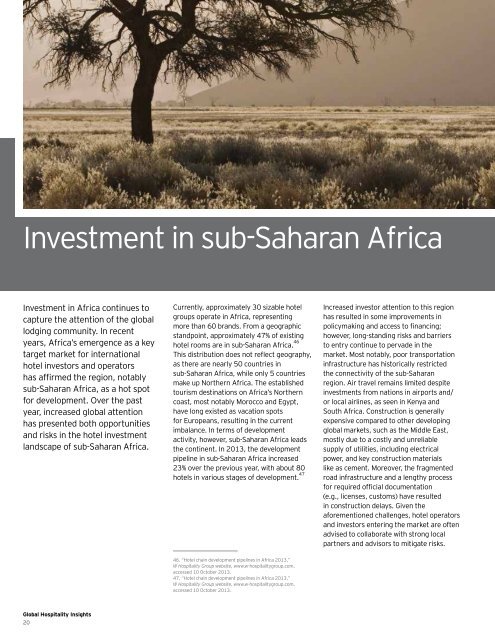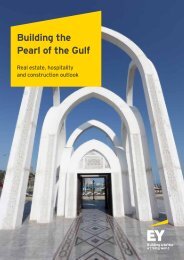0iQESq
0iQESq
0iQESq
You also want an ePaper? Increase the reach of your titles
YUMPU automatically turns print PDFs into web optimized ePapers that Google loves.
Investment in sub-Saharan Africa<br />
Investment in Africa continues to<br />
capture the attention of the global<br />
lodging community. In recent<br />
years, Africa’s emergence as a key<br />
target market for international<br />
hotel investors and operators<br />
has affirmed the region, notably<br />
sub-Saharan Africa, as a hot spot<br />
for development. Over the past<br />
year, increased global attention<br />
has presented both opportunities<br />
and risks in the hotel investment<br />
landscape of sub-Saharan Africa.<br />
Currently, approximately 30 sizable hotel<br />
groups operate in Africa, representing<br />
more than 60 brands. From a geographic<br />
standpoint, approximately 47% of existing<br />
hotel rooms are in sub-Saharan Africa. 46<br />
This distribution does not reflect geography,<br />
as there are nearly 50 countries in<br />
sub-Saharan Africa, while only 5 countries<br />
make up Northern Africa. The established<br />
tourism destinations on Africa’s Northern<br />
coast, most notably Morocco and Egypt,<br />
have long existed as vacation spots<br />
for Europeans, resulting in the current<br />
imbalance. In terms of development<br />
activity, however, sub-Saharan Africa leads<br />
the continent. In 2013, the development<br />
pipeline in sub-Saharan Africa increased<br />
23% over the previous year, with about 80<br />
hotels in various stages of development. 47<br />
Increased investor attention to this region<br />
has resulted in some improvements in<br />
policymaking and access to financing;<br />
however, long-standing risks and barriers<br />
to entry continue to pervade in the<br />
market. Most notably, poor transportation<br />
infrastructure has historically restricted<br />
the connectivity of the sub-Saharan<br />
region. Air travel remains limited despite<br />
investments from nations in airports and/<br />
or local airlines, as seen in Kenya and<br />
South Africa. Construction is generally<br />
expensive compared to other developing<br />
global markets, such as the Middle East,<br />
mostly due to a costly and unreliable<br />
supply of utilities, including electrical<br />
power, and key construction materials<br />
like as cement. Moreover, the fragmented<br />
road infrastructure and a lengthy process<br />
for required official documentation<br />
(e.g., licenses, customs) have resulted<br />
in construction delays. Given the<br />
aforementioned challenges, hotel operators<br />
and investors entering the market are often<br />
advised to collaborate with strong local<br />
partners and advisors to mitigate risks.<br />
46. “Hotel chain development pipelines in Africa 2013,”<br />
W Hospitality Group website, www.w-hospitalitygroup.com,<br />
accessed 10 October 2013.<br />
47. “Hotel chain development pipelines in Africa 2013,”<br />
W Hospitality Group website, www.w-hospitalitygroup.com,<br />
accessed 10 October 2013.<br />
Global Hospitality Insights<br />
20



